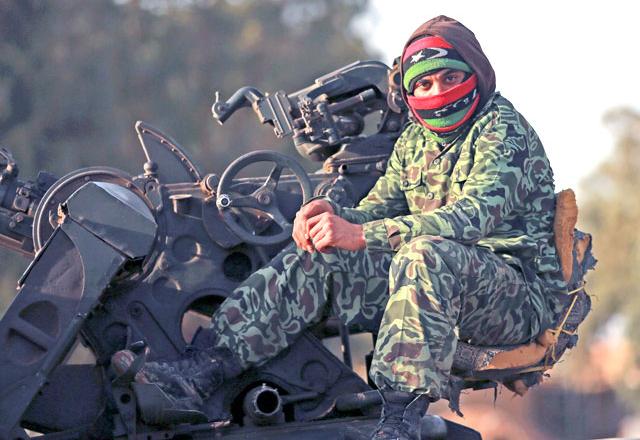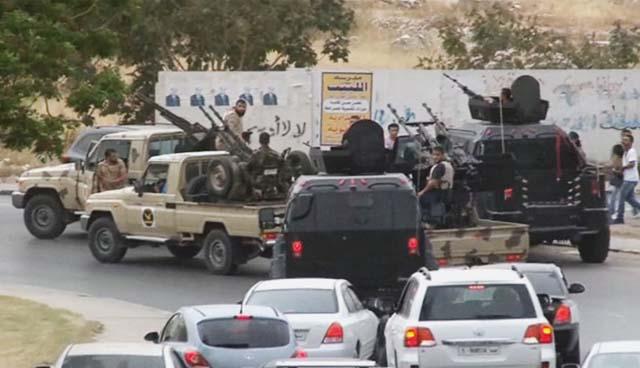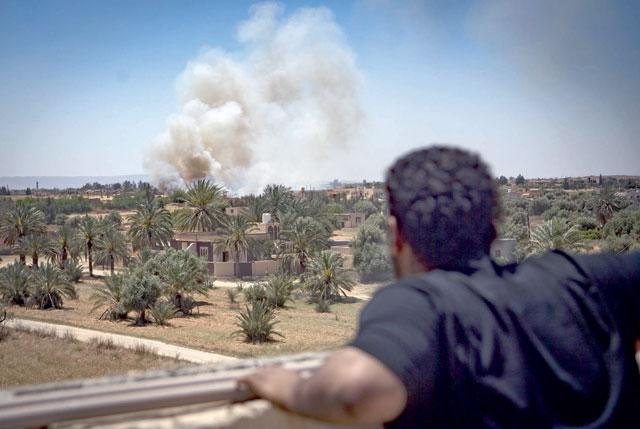You are here
Libya oil-field attack is blow to UN peace talks
By Reuters - Mar 10,2015 - Last updated at Mar 10,2015
CAIRO — An attack by Islamist militants on a Libyan oil-field where they beheaded security guards and kidnapped foreign workers underlines the difficulties facing UN-sponsored peace talks due to resume this week.
Libyans have become accustomed to chaos, with their country split between two rival governments each allied to heavily armed groups that have been fighting for control of the oil-producing nation since the fall of Muammar Qadhafi in 2011.
But last week’s attack on the Al Ghani oil-field in central Libya marks a new departure. The attackers did not seize it to make financial or political demands as armed groups often do.
Instead, they mounted a show of force that appeared in line with warnings that the Islamists are bent on exploiting Libya’s turmoil to extend their influence.
“They came to burn the facilities and kidnap or kill the workers and guards,” said Ali Al Hassi, a spokesman for an oil-field security force. “Then they left.”
The militants have not yet made a statement on the attack but officials have blamed Daesh, which has in the past boasted of its ability to kill soldiers or civilians in Libya.
The UN special envoy for a Libya, Bernardino Leon, said last week that Daesh militants would “stop at nothing” to strengthen their presence in the country.
The violence illustrates the challenge facing the United Nations which has been hosting talks between rival parties with the aim of forming a national unity government.
Libya is divided between the internationally recognised government, which has been based in the east since a faction called Libya Dawn seized the capital in August, reinstated the old assembly and set up a rival administration.
The UN had planned to resume talks on Wednesday but the elected parliament, which is also based in the east, asked late on Tuesday for a one-week delay to study a roadmap proposal to form a national government, a parliamentary spokesman said.
There was no immediate reaction from the UN and the Tripoli-based rival parliament.
The UN has invited moderate leaders to join the talks, which have been going on since September. But analysts see little chance of success as the country is fracturing, with small armed groups increasingly calling the shots, as in the oil-field attack.
“There are too many players — and the fighters don’t necessarily answer to their respective leaderships,” Richard Cochrane, senior analyst, MENA, at consultancy IHS Country Risk, told the Reuters Global Oil Forum.
Both governments represent loose alliances of former rebel groups who helped topple Qadhafi but have since fallen out along political and regional lines.
Libya Dawn
Libya Dawn draws support form from western cities such as Misrata, and includes Islamists, the Amazigh minority, and business people.
In the east, an umbrella of tribes, federalists campaigning for autonomy, and military figures such as Khalifa Haftar, a former Qadhafi general, dominate the scene.
Both sides have been fighting each other on several fronts, creating a vacuum exploited by militants loyal to Daesh, the group that has seized large parts of Syria and Iraq.
The militants have drawn support from Libyan jihadists who fought in Syria and returned to cities such as Derna or Sirte. While Daesh alliance seems to have split into small groups, it attracts fighters from other factions, such as Ansar Al Sharia, by conducting spectacular attacks.
A big problem for peace efforts is that neither the United Nations nor Western powers backing the talks have a presence in Libya — they evacuated their Tripoli missions in the summer for security reasons.
Having relocated to Malta or Tunis, diplomats try to stay in contact with moderate Libyan figures by phone or when they travel abroad.
But with no team on the ground, UN envoy Leon often finds himself agreeing on something during a day trip to Tripoli or Tobruk only for hardliners to torpedo it the next day.
Husni Bey, a prominent Libyan entrepreneur, blamed a few hardline figures for encouraging war. “Ninety-nine percent of us, the Libyan people, want peace and are against war, death, injury and destruction,” he said
In the east, Haftar has emerged as a new strongman, fighting his own war against Islamist militants and using his warplanes to attack civilian airports under the control of Libya Dawn, which has also carried out air strikes and tried to seize major oil ports with troops.
But his recent promotion to army commander in the east has had the effect of helping Libya Dawn in Tripoli to become more united, analysts say. And while business leaders on that side had been pushing for a quick deal, Haftar’s elevation is as unacceptable for them as it is for hardliners.
“I think talks and fighting will run as parallel tracks for some time, as happened in Somalia where years passed between a first national unity government and a modicum of stabilisation,” Mattia Toaldo, policy fellow at the European Council on Foreign Relations, told the Reuters Global Oil Forum.
Related Articles
Gunmen possibly linked to Islamist militants assaulted and seized control of a Libyan oilfield, killing and kidnapping several workers, Libyan and foreign officials said on Wednesday.
Heavily armed gunmen stormed Libya’s parliament with anti-aircraft weapons on Sunday in an assault claimed by forces loyal to a renegade ex-general who has vowed to purge the country of Islamist militants.
TRIPOLI/BENGHAZI, Libya — An armed group attacked Libya's largest oilfield but was repelled after clashes with its protection force on Monda


















